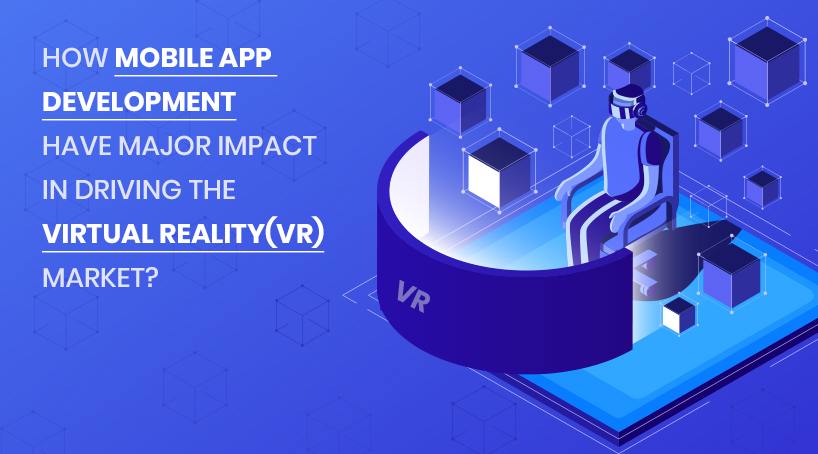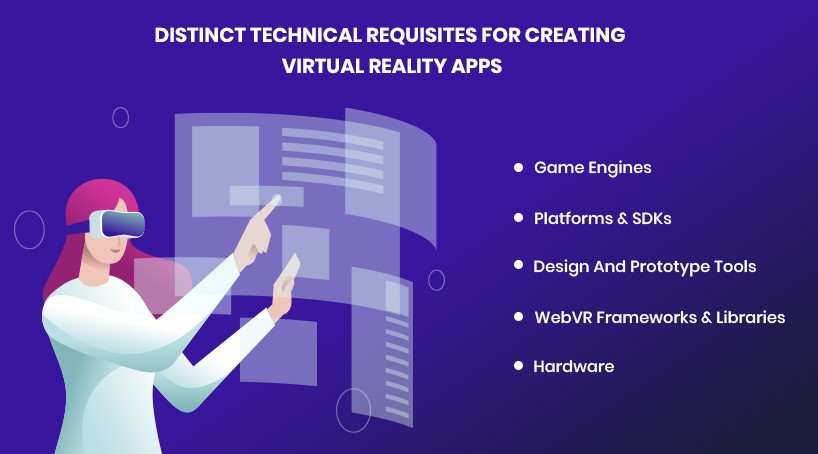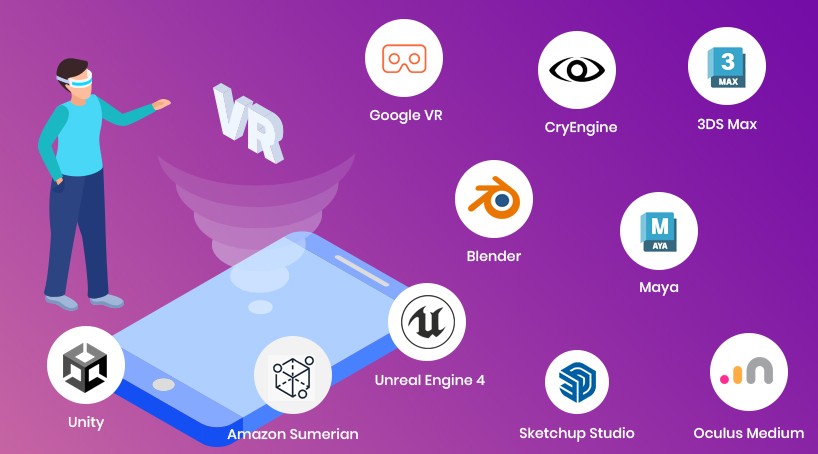- 9 min read
- May 13, 2022
- 0

The virtual reality market is gaining momentum since 2019 when industries and sectors realise the benefits of virtual reality technology, they started implementing them in business. The increase in popularity has resulted from the increase in demand for VR applications. The mobile app development companies have produced VR devices that have made the technology available to users.
Mobile phones can well function like Virtual Reality gadgets. There are different positive outcomes of VR. In addition to streamlining communication between prospective clients and businesses. Several industries such as fashion, manufacturing and games have recognized the advantages of VR applications. In this blog, we will explain how mobile app development is driving the Virtual Reality industry on loop. This VR app guide will focus on the ways app development is transforming the VR landscape, the different features of a functional VR app, and many more.
What Is Defined as a VR app?
Virtual reality is considered a powerful computer technology that produces artificial environments that comes in a form of realistic stereoscopic 3D virtual physical environments. Several computer applications including video games or apps for watching movies enable users to indulge in a completely virtual environment.
Creating immersive worlds through a smartphone can become exciting. Firstly, the images on the computer can be used to simulate the environment you are in. Secondly, the 3D models of the environment are projected on the screen enabling the viewers to rotate, move around and display in form of 3D. Finally, the vision of viewers is controlled by a headset allowing images to appear floating through space.
Distinct Technical Requisites For Creating Virtual Reality Apps

VR app development can be a complex process that effectively requires strong knowledge of diverse tools and technologies for reaching the quality levels crucial for commercial success. One of the relevant development principles in virtual reality apps is to create them with high performance, full application code, and low-power architecture. This involves the effective usage of prototyping tools, libraries, development environments, and frameworks for potential VR application development.
- Game Engines
Popular game engines such as Unity’s Game studio, Unreal engine, Nvidia’s Havok and Unity 3D of Gear VR are renowned in the gaming industry. These engines stores data that the user views and are integrated with platform SDKs.
- Platforms & SDKs
Effective VR apps begin with selecting a power platform and SDK. It supports several software platforms such as Oculus Home, SteamVR, and XboxVR. The developers need to develop games specifically for the platforms. However, you should begin with the selected brand-specific SDK for developing a VR experience.
- Design And Prototype Tools
In order to develop a Virtual Reality app, the development team has to consider prototyping the VR experience for testing and validation. With the help of prototyping, one can test a 360-degree view for sensing scale & depth, using available sensors, and viewing the position of VR. VR software & app developers have hands-on experience in using Google Blocks, Photoshop, Cinema 4D, Framer, and A-Frame.
- WebVR Frameworks & Libraries
WebVR can be delineated as a Javascript that runs in a browser on the web and administers an API for usage in VR apps. On the contrary, WebGL enables the application to present graphics on the web. The objects are dynamic and thereby it requires to create and destroy WebGL objects frequently.
- Hardware
Developing an AR application is a work of strong expertise that requires hardware usage. In this context, we have given a cluster of hardware for VR apps such as light mobile VR headsets, consoles, premium mobile VR headsets, VR haptic feedback suits, and standalone headsets.
How Mobile Application Development Is Transforming Virtual Reality Scenario?
Virtual reality and augmented reality are becoming the greatest app development trends embraced by various businesses and industries all over the globe. As the leading mobile app development company in Canada, Nextbrain offers robust and scalable VR app development solutions to clients all across the globe. The apps enable users to view products and services in real-life environments.
Embellishes Business Efficacy
In recent times, virtual reality apps have improved the way business operations are progressing. With the help of VR applications, business owners can conduct meetings as well as teleconferences in a smoother way. This results in proper time management and elimination of expense in travel costs for attending meetings.
Advancing Learning Proficiency
Different educational sectors are also making the effective usage of VR applications for making the learning process more engaging and simpler. Students are capable of taking virtual field trips using Google Expeditions.
Enhanced Virtual Experience
Experienced mobile app developers are creating amazing VR applications for several online activities like online booking, eCommerce purchasing and many more. When it comes to the shopping experience VR technology offers users an app for stores. In this way, customers can get a 360-degree view of the product. This brings satisfaction to customers and saves the precious time they might invest in offline shopping and visiting places.
VR apps enhance the overall virtual experience of customers by elevating the way customers view products or services. It enables enterprises and businesses to offer excellent customer experience.
User Engagement & Brand Loyalty
With a real life-like experience of VR apps, users get completely engaged in the app leading to an increase in customer satisfaction. Virtual reality apps enabled marketers to reach their prospective customers and build interactions closely. Several businesses and companies are taking advantage of this technology for creating apps that have enabled them to promote products and services building brand loyalty.
Excellent Mode of Communication
In the past, applications are utilized for building phone communication between consumers and businesses. As the top Virtual Reality app Development Company in Toronto, Nextbrain uses advanced VR technologies and tools for improving the mode of communication in customer applications. Businesses can make use of real-time video to create direct contact with clients.
Mobility Benefits
Mobility is a major factor when it comes to contributing to the ultimate success of the mobile application. VR apps have enabled users to experience mobility and experience many other opportunities when they don’t have to be in that place.
Advantages of Virtual Reality Apps for Businesses
Virtual reality apps have their own benefits in multiple industry verticals. In this context, we will learn the multiple functions and benefits of VR apps for businesses and enterprises.
- Powerful Virtual Reality Product Development
Several businesses that concentrate on developing real-life products can take advantage of virtual reality apps. This maximizes the efficiency and VR-powered prototypes enables interacting virtually with a product and evaluating it.
- Newer Experiences for Nurturing Loyalty And Attracting Customers
The advent of VR technology offers businesses the flair to connect with customers even before they are investing money in buying your product. With the help of VR, enterprises can create a sense of engagement and authenticity between brands, companies and consumers.
- Immersive marketing
If you are wondering about immersive marketing, then VR technologies are a powerful tool for immersing customers in digital experiences. This, in turn, enables customers to interact with brands. VR applications enable businesses to engage their customers in excellent ways.
Top Tools for Virtual Reality Development

Unity
Unity is popular for game development for building Virtual Reality solutions for different sectors like manufacturing, media, automotive, transportation, entertainment and many more. It has tools like :
- CAD tools
- Designer and artist tools
- Potential editor for creating Unity 3D VR assets
- Collaboration tools
Google VR
Google provides a huge range of VR development tools. These tools can be used to create an immersive VR experience for users. One can access these tools on the Google VR developer portal and can be used for developing VR apps for multiple platforms such as Unity, iOS, Unreal, Android, and the web.
Amazon Sumerian
Amazon Sumerian is considered the VR engine from AWS. It eradicates the need for 3D graphics and VR programming skills to use it. Amazon Sumerian effectively works with different popular VR platforms and it comprises many powerful features are as follows:
- Sumerian editor
- Sumerian Hosts
- Asset management
- The capability of scripting the logic in the scenes that you create.
Unreal Engine 4
Unreal Engine 4 or UE4 provides a complete set of virtual reality development tools. With the help of UE4, one can develop VR applications that will work on distinct VR platforms like Oculus, Samsung Gear VR Sony, Android, iOS, and others.
The Unreal Engine 4 platform comprises different features comprising:
- The UE4 provides accessibility to its C++ source code as well as Python scripts. Therefore an experienced VR developer can easily study the engine and also acknowledge the ways to use it.
- With the UE4 tool, one can create prototypes quickly.
- It helps in adding sequence, audio, effects, animation, simulation, etc.
- The engine has a multiplayer framework, thereby offering real-time rendering of visuals and an editor.
Blender
Blender is regarded as an open-source 3D creation suite, which is free. With the help of Blender, one can create a 3D pipeline with rigging, animation, modeling, rendering, simulation and others.
CryEngine
CRYENGINE is remarkable to 3D game developers and is considered a popular choice for a VR software development tool. One can build virtual reality apps with it. It consists of features such as building real-time visualizations, built-in studios, creating characters and more.
3DS Max
3ds Max is considered a powerful 3D modeling and rendering software that is offered by Autodesk. The 3D modelers can use it for creating robust video game design visualization. It administers offers a huge range of features like workflow, pipeline, 3D rendering, UI, 3D animation and many more.
Maya
As a powerful software, Maya offers different tools for 3D animation, 3D rendering, dynamics, 3D modeling, effects, pipeline integration, 3D shading, motion graphics, and so forth.
Sketchup Studio
A popular 3D modeling tool, Sketchup Studio mainly emphasizes on construction industry sector including architecture. It has tools that enable excellent graphics offering construction sector-specific features by integrating AR and VR.
Oculus Medium
Oculus is a powerful provider of VR platforms such as Oculus Quest, Oculus Go and Oculus Rift S. It provides effective Virtual Reality development software, named Medium. It is a comprehensive tool, which allows you to create 3D assets.
Final Considerations
Nowadays, Virtual Reality has taken over the entire market and app market. Are you looking to create a VR app for your eCommerce business? Nextbrain is the top VR and mobile app development company in Toronto, Canada offering a wide range of VR app solutions and VR app development services. The company comprises experienced developers who have several years of knowledge in creating high-end VR app platforms for multiple business jargon. Connect with the professional to know more about VR apps and their benefits.
